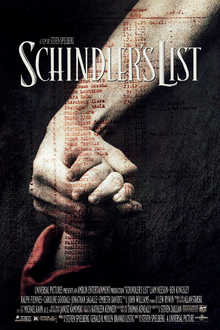
Back Schindler's List Afrikaans Schindler's List AN قائمة شندلر (فيلم) Arabic لستة شيندلر ARZ Schindler's List AST Şindlerin siyahısı Azerbaijani شیندلرین سیاهیسی (فیلم، ۱۹۹۳) AZB Спіс Шындлера Byelorussian Списъкът на Шиндлер Bulgarian শিন্ডলার্স লিস্ট Bengali/Bangla
| Schindler's List | |
|---|---|
 Theatrical release poster | |
| Directed by | Steven Spielberg |
| Screenplay by | Steven Zaillian |
| Based on | Schindler's Ark by Thomas Keneally |
| Produced by |
|
| Starring | |
| Cinematography | Janusz Kamiński |
| Edited by | Michael Kahn |
| Music by | John Williams |
Production companies | |
| Distributed by | Universal Pictures |
Release dates |
|
Running time | 195 minutes[1] |
| Country | United States |
| Language | English |
| Budget | $22 million[2] |
| Box office | $322.2 million[3] |
Schindler's List is a 1993 American epic historical drama film directed and produced by Steven Spielberg and written by Steven Zaillian. It is based on the historical novel Schindler's Ark (1982) by Thomas Keneally. The film follows Oskar Schindler, a German industrialist who saved more than a thousand mostly Polish–Jewish refugees from the Holocaust by employing them in his factories during World War II. It stars Liam Neeson as Schindler, Ralph Fiennes as SS officer Amon Göth, and Ben Kingsley as Schindler's Jewish accountant Itzhak Stern.
Ideas for a film about the Schindlerjuden (Schindler Jews) were proposed as early as 1963. Poldek Pfefferberg, one of the Schindlerjuden, made it his life's mission to tell Schindler's story. Spielberg became interested when executive Sidney Sheinberg sent him a book review of Schindler's Ark. Universal Pictures bought the rights to the novel, but Spielberg, unsure if he was ready to make a film about the Holocaust, tried to pass the project to several directors before deciding to direct it himself.
Principal photography took place in Kraków, Poland, over 72 days in 1993. Spielberg shot in black-and-white and approached the film as a documentary. Cinematographer Janusz Kamiński wanted to create a sense of timelessness. John Williams composed the score, and violinist Itzhak Perlman performed the main theme.
Schindler's List premiered on November 30, 1993, in Washington, D.C., and was released on December 15, 1993, in the United States. Often listed among the greatest films ever made,[4][5][6][7] the film received widespread acclaim for its tone, acting, atmosphere, score, cinematography, and Spielberg's direction; it was also a box office success, earning $322.2 million worldwide on a $22 million budget. It was nominated for twelve awards at the 66th Academy Awards, and won seven, including Best Picture, Best Director and Best Adapted Screenplay. The film won numerous other awards, including seven BAFTAs and three Golden Globes. In 2007, the American Film Institute ranked Schindler's List 8th on its list of the 100 greatest American films. The film was deemed "culturally, historically or aesthetically significant" by the Library of Congress in 2004 and selected for preservation in the U.S. National Film Registry.
- ^ British Film Board.
- ^ McBride 1997, p. 416.
- ^ "Schindler's List (1993)". Box Office Mojo. Archived from the original on April 16, 2021. Retrieved April 16, 2021.
- ^ Corliss & Schickel 2005.
- ^ Maltin 1999.
- ^ Channel 4 2008.
- ^ "AFI's 100 Years ... 100 Movies – 10th Anniversary Edition". American Film Institute. June 20, 2007. Archived from the original on May 19, 2019. Retrieved June 1, 2020.